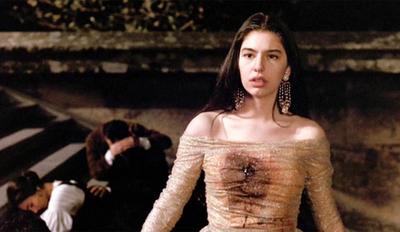
I hadn't seen Godfather III in a long time; in my mind I carried it in two hands, marked like Robert Mitchum's in Night of the Hunter: one said "love," the other, "hate"--although "hate" is too strong a word, and one too simple to describe the uncertain shrug I sometimes inclined toward the movie, or an almost embarrassed tilt of the head; any number of gestures that slid Godfather III to the rear of the shelf. And watching it yesterday brought back a few of those tics. Despite my growing admiration for the trilogy as the decades have rolled, I always hesitated as my hand reached for the final installment.
To be honest, I think the movie does invite a certain tentativeness on the part of the viewer. It came late, sixteen years after Godfather II, and the threads of its fabric were a bit thin and frayed. I remember in 1990 being glad Coppola was going to do a third Godfather: the previous two were a perfect marriage of the soap opera and the pulp novel, with the glow of all those remarkable performances, Dean Tavoularis' richly layered production design, and Gordon Willis' alternately brassy and brooding cinematography, all burnished with Nino Rota's emblematic score. And these were all called into the service of a set of ideas about family, culture, and, here we go again, sin, to which Coppola was deeply committed. I looked forward to another chance to see that world made.
The first two films, though, marked an accomplishment I thought he couldn't top--which he didn't, and I am only recently realizing that he didn't need to. My grumbling about the choppy exposition, the sometimes-stilted dialogue, and, as many others noticed, Sophia Coppola's performance, has subsided over the years. It began with an assertion by a friend that Francis' daughter actually does a good job of playing a young girl in her father's shadow--retroactively, it even seems like typecasting rather than a last-minute patch-job (Winona Ryder was set to play Mary Corleone, but pulled out). My reconciliation with her performance allowed me to see the larger accomplishment of Godfather III: the deep resonance of family and culture and sin. Michael's youth is gone, but the iron-clad family values of his past--which also, one should note, served to tear that family apart--live on in his sister Connie (Talia Shire) and nephew Vincent (Andy Garcia). Shire delivers the performance of her career; Connie is part Borgia, part Sicilian Madame LaFarge, perpetually knitting the doom of traitors. Andy Garcia as Vincent, Sonny's (James Caan) illegitimate son, enjoys himself immensely as he chews up the scenery--and Joe Mantegna's ear--with his fierce loyalty and fierce passions and, ah, fierce everything. It is, I'm glad to say, not a subtle performance.
Of course, at the center is Al Pacino. In Godfather III he hits some interesting notes we haven't heard from Michael. There is at times a kind of self-effacing playfulness in Michael, an almost satiric jab at his self-made image. When he re-asserts himself as Godfather via Vincent, Connie tells him, "Now they will fear you." He quips with a bit of a grin, making him the only one in the room smiling, "Maybe they should fear you." And those broad strokes--his tears, his face buried in his hands, his stumbling and screaming, his diabetic delirium as he shouts Fredo's name--seemed beautiful and necessary as I watched it last night. The movie is haunted by Fredo, who forces Michael to confession, submission, and finally rough justice, as Mary is killed because Michael couldn't stop taking care of business. Pacino has Michael clutch his guilt as if it were the last prayer he would manage.
It is almost cruel, the way Coppola leads Michael to the dark, dry well in which he has dumped his sins, but from which he must drink. At the end, Michael is abruptly pushed into senility and a crumpled death under a shadowless Sicilian sky, the sun beating him to the ground. It seems that as Coppola ran out of pity for Michael he delegated the task to us. I know I was shaken every time Fredo's ghost arose, and watched in horror as Michael's face froze breathlessly before the inevitable scream over Mary's death. At that moment Pacino vomits out every act of contrition that stuck in Michael's craw, and leaves nothing afterward but the sound of that cry hanging in the air like Judgment.
No comments:
Post a Comment